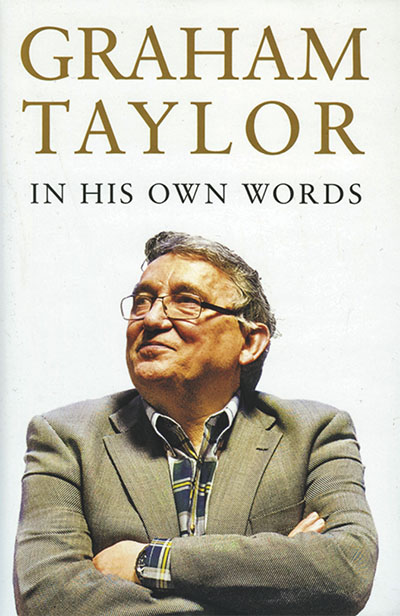
Peloton Publishing, £18.99
Reviewed by David Harrison
From WSC 375, April 2018
Buy the book
The untimely loss of Graham Taylor in January 2017 provoked in turn expressions of shock, sadness and affection. The last of those represented a commodity massively prevalent in and around Scunthorpe, Grimsby, Lincoln, Watford, Birmingham and Wolverhampton. National perception, driven predominantly by his tabloid portrayal, was far less positive.
On Taylor’s passing, however, there was widespread acknowledgement of a good man and an outstanding club manager. This chronological, easy-to-read study, compiled with the assistance of journalist Lionel Birnie, takes a leisurely stroll through Taylor’s life using, as source material, copious notes taken throughout his managerial career.
As a Watford follower, having observed the full span of his managerial involvement, I eagerly turned to the sections covering Taylor’s spells at Vicarage Road. They duly recalled wonderful times and achievements at a club he progressively transformed, although I learnt nothing of substance. But then I’d have been surprised had that been the case and suspect fans of the other clubs Taylor managed will arrive at a similar conclusion.
The most enjoyable passages contain incidental snippets. I liked the image of Taylor, far from convinced he should drop down a division from Lincoln to Watford, deciding to take his wife along to meet Elton John at his palatial property. Having traversed the lengthy driveway, they knocked on the door which was duly opened by a lady they assumed to be a housekeeper but was actually John’s mother, neatly prefacing what they subsequently turned into a proper family club.
Doug Ellis features extensively, following Graham’s 1987 move to Villa Park. From dealing with Elton, happy to hand over running all aspects of the club to his ambitious young manager, things at Villa could hardly have been more different. Stories of Taylor hiding from Ellis and then providing him with deliberately incorrect details of his team selection for the following weekend, knowing the chairman would take them to the press, provide material of the sort necessary to lighten an essentially factual story.
Taylor’s spell as England manager was when things started to unravel. He’s painfully honest about that period and admits possessing no real understanding of what the job would entail. Losing day-to-day running of a club, specifically a dressing-room, was a body-blow to a man steeped in player contact. The international position bore no relationship to the club role he’d filled with such distinction. Nevertheless, his enduring tolerance towards the tabloid journalists who intruded so appallingly into his personal life was remarkable.
His time with England makes for uncomfortable reading, with Gary Lineker and Paul Gascoigne among his toughest managerial challenges, but the underlying decency of the man shines through. Subsequent attempts at rehabilitation, frustratingly unsuccessful at Wolves but gloriously positive back at Watford, round off the story neatly.
The sense of bookending his miserable international experience with successful club achievements is inescapable. Lincoln’s admirable Danny Cowley appeared on television recently explaining how he’d decided to help rebuild the club by getting players out into schools and the wider community. Just 40-odd years after Taylor had taken the same action, probably into the same schools.